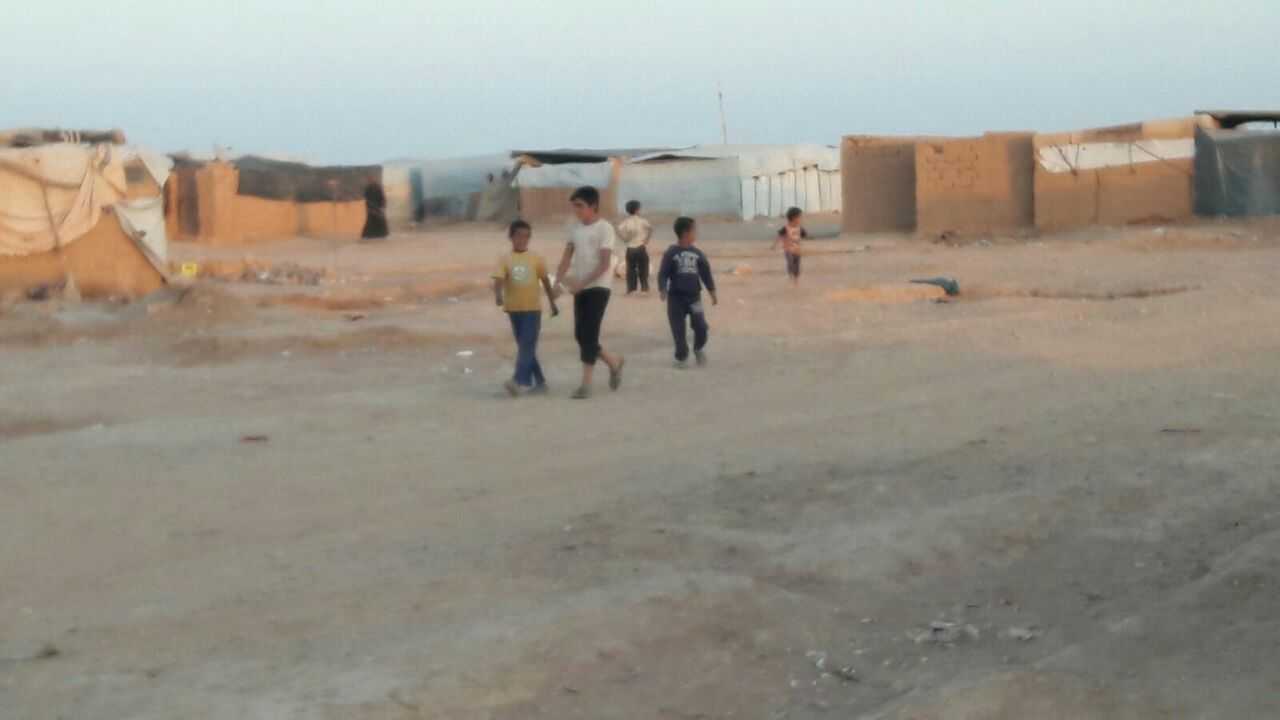As battles approach, displaced Syrians empty border camp: ‘No stability in our lives’
AMMAN: The Hadalat displacement camp along Syria’s southeastern border was […]
6 September 2017
AMMAN: The Hadalat displacement camp along Syria’s southeastern border was “totally emptied out” on Wednesday, two rebel spokesmen and a camp official on the ground told Syria Direct, as regime forces approach amid lightning advances in the eastern desert.
All of the estimated 5,000 residents of Hadalat, a remote displacement camp along the Jordanian border, are now residing roughly 100 kilometers northeast in the much larger, yet similarly impoverished Rukban border camp. Two Free Syrian Army-affiliated rebel factions began evacuating the residents last week, Younis Salameh, a spokesman for the FSA’s Jaish Usud a-Sharqia told Syria Direct on Wednesday. His militia, along with the FSA-affiliated Martyr Ahmad al-Abdo Brigade, carried out the evacuations.
The expedited evacuations took place because of “the approach of the regime and intensification of the bombings,” Salameh said, adding that Assad’s forces are currently just 12 kilometers west of Hadalat.
The camp is “increasingly close to the battles, and has been hit by airstrikes more than once,” Ahmad al-Abdo Brigade spokesman Saeed Seif told Syria Direct from the eastern desert region on Wednesday. “That was the basis for our decision to transport Hadalat residents to Rukban.”
For displaced Syrians who watched from Hadalat, the regime’s approach meant a battlefront inching closer to their makeshift tents and mud homes along the border.
Today, Hadalat is “totally empty,” the Usud a-Sharqia spokesman said. Saeed Seif, a spokesman for the Ahmad al-Abdo Brigade, and Sheikh Abu Fawwaz, a security official in the Rukban border camp, home to 75,000 internally displaced Syrians, confirmed to Syria Direct that Hadalat was empty as of Wednesday.

Wednesday saw “the last families leave” Hadalat for the relative safety of Rukban, Seif added, with “nobody left behind.”
“We fled out of fear of the advancing regime forces,” Moataz al-Mohammad, a displaced Hadalat resident told Syria Direct. Originally from Palmyra, the 29-year-old father of three was one of the thousands who evacuated the camp “amid the fear of a possible massacre against us,” he said. “We are unarmed civilians.”
Recent Rukban arrival Maha al-Abdallah said she also had little choice in the decision to leave Hadalat.
When local rebel fighters learned how close regime forces were to the camp last week, “they told everyone to get ready to leave,” al-Abdallah told Syria Direct from a tent in Rukban on Wednesday.
She left Hadalat one week ago alongside her five sons, afraid of soon finding herself along an even closer front line. “Everyone else around us was getting ready to leave too,” she said. For al-Abdullah, the approaching regime forces posed a special threat—her grown sons could face arrest or forced conscription into the Syrian army if discovered by regime authorities.
“There was no other option” for her and her sons but to leave, she said. “Rukban is the only safe place for us.”
For Moataz al-Mohammad, the nearby battle meant leaving behind the mud home that he built for his wife and children; the family’s sole source of stability amid displacement. He poured $240, a fortune for most Hadalat residents, into building the modest house.
“I lost the house that was a refuge for my family and me,” he told Syria Direct on Tuesday. Today he lives with relatives in Rukban in their own makeshift mud home, though his relatives’ financial situation is “even worse” than his, he said. “For how long can I remain dependent on them?”
Battle for the Syrian Badia
Syrian regime forces are making lightning advances elsewhere in the country’s remote, open eastern desert region known as the Badia, where there is little to slow down the onslaught of airstrikes, armored vehicles and ground forces.
On Tuesday, Assad’s forces and allied militias breached a three-year Islamic State siege of the eastern city of Deir e-Zor, following two weeks of major victories against the Islamic State in the open, largely empty desert west of the former stronghold. Syrian President Bashar al-Assad later called the breakthrough a “resounding victory,” state media outlet SANA reported the same day.

Hundreds of kilometers to the south, the Syrian army is now advancing steadily eastward along the southern border with Jordan, capturing dozens of kilometers of remote rebel territory as it approaches the ill-equipped Hadalat camp.
Syrian families who first fled to the informal encampment 2015 already faced displacement due to Islamic State forces seizing their hometowns in central Homs province. They sought refuge in the no-man’s-land between two earthen berms marking the Syrian and Jordanian borders.
Food, water and medicine were scarce in Hadalat, where some residents were surviving “solely on flour and water,” UN Deputy Spokesman Farhan Haq said in a statement last month. Families were living together in makeshift tents and mud homes dotting the harsh, open desert landscape.
Hadalat residents are now twice displaced. Hundreds of people began paying their way for transportation out of the camp last month as regime warplanes circled overhead, following advances in southern Suwayda province and airstrikes that hit just 100 meters from camp residents, Syria Direct reported at the time. Last week marks the first time local rebel militias officially evacuated residents from the encampment.
Dozens of Hadalat families streamed across the desert into Rukban, moving in with relatives in simple mud homes. Those without family members living in Rukban simply rely on receiving food and shelter from a settlement already starved of basic supplies.
Unlike al-Abdallah, who hopes to avoid returning to regime territory, al-Mohammad is now considering returning to regime-held Palmyra, despite the risk of arrest or “being forced to enlist,” he told Syria Direct.
For him, leaving behind his makeshift house in Hadalat and living in poverty in Rukban are enough.
“We are exhausted from being homeless and living without any stability.”







